
| Type of paper: | Course work |
| Categories: | Politics United States Inflation Ecology Air pollution |
| Pages: | 3 |
| Wordcount: | 653 words |
As Meg Jacobs argues in his essay, the 1970s were the times that the United States faced inflation and production problems (Schulman, 193). This was the time that Richard Nixon had raised into power (Schulman, 194). The shortages in gas and petroleum are seen to be caused by the political class. It was due to this that the conservatives and liberal classes had to fight for their rights. The conservatives used power to control the production of petroleum products. As explained in this context, the policies that were adopted by Nixon's government had an effect on inflation.
The Clean Air Act and the Environmental Protection Act are among the laws that were enacted by Nixon in favor of the conservative opinion (Schulman, 195). The control of such industry did not favor production. The move to regulate prices by the government made it hard for producers to make profits. This however changed when Nixon realized that many people had turned against him. He had made more people fight for the production of gases and petroleum which were in high demand. Promotion of imports into the United States to curb inflation had brought about low profits from domestic products.
Since the country had depended on imported petroleum, the Arab-Israel war led to a crisis as an influx of oil products from Saudi Arabia stopped. The high demands in the country had no supply; hence this defined the inflation that was experienced. Leadership which was respected for economic control ended up losing respect. American leaders depended on oil for their political gains and this, therefore, controlled their decisions.
According to Edward D. Berkowitz, the causes of this phenomenon can be divided into macroeconomic, inflation and prices control (p. 53-70). As discussed by Jacobs, the control on prices of petroleum in the 70s could have led to a shutdown of more oil production firms. Unemployment which is a result of inflation was a result when the producers collapsed. Importation led to low prices hence there was control in domestic prices. Policies that were passed led to falls in terms of Gross National Product. The fall made the government spend more but earn less.
Inflation can be explained by the Philips curve, the curve was seen to contain a relationship between unemployment and inflation (Edward, 55). The employed people seemed to earn less money because expenses were too much. There was need to have more wages, on the government side, they had to reduce wages so that they could reduce their expenses. The curve, however, failed to work for the time that Nixon was in power, importation of goods was among the solutions that were sort.
Through this scenario, the conservatives had found it hard in fighting for liberalism. The higher demands for oil; to use in cars, were an issue that made more oil to be used despite the opinions conserves the environment. Nixon's economic advisers seem to have led him to the opposite of what was expected by every citizen. Every decision that was made was based on personal interests. The political class used their power to have what they wanted.
The division between classes of people is also explained by Jefferson Cowie as he narrates that the time Nixon was in leadership, the working class and producers had issues with political leaders; leaders took advantage of the power they had to control people. The fight for identity had the working class to reason out with Nixon after several riots, this was aimed at Nixon's re-election (p.235).
Work cited
Milligan, Ian. "Stayin' Alive: The 1970s and the Last Days of the Working Class (review)." Labour / Le Travail, vol. 69, 2012, pp. 235-237.
"Running Out of Gas: The Economic Downturn and Social Change." Something Happened: A Political and Cultural Overview of the Seventies, by Edward D. Berkowitz, Columbia University Press, 2006, pp. 53-70.
Schulman, Bruce J, and Julian E. Zelizer. Rightward Bound: Making America Conservative in the 1970s. Cambridge, Mass: Harvard University Press, 2008. Print.
Cite this page
Free Essay on Energy Crisis. (2023, Jan 19). Retrieved from https://speedypaper.com/essays/energy-crisis
Request Removal
If you are the original author of this essay and no longer wish to have it published on the SpeedyPaper website, please click below to request its removal:
- Essay Example on the Mechanisms for Businesses to Adapt to the Climate Changes
- Essay Example on Cyber Security and Risk Response
- Essay Example on IT Security
- Free Essay Sample: Bioenergy and Its Environmental Properties
- Research Paper Sample on the Levels of Vitamin D in Patients with Graves Disease
- Argumentative Essay Example on Orthorexia
- The Unethical use of Hush Money in College Admissions Scandal
Popular categories




